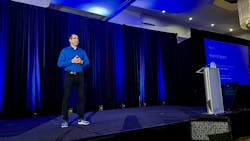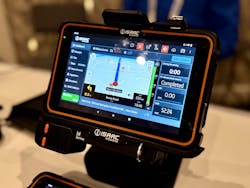ISAAC unveils new AI-assisted features, vision for the future
CHARLOTTE—With a freight recession, budgets tighter than ever, and fleets under pressure to protect their bottom line, spending money on advancing maintenance and safety technologies can seem frivolous.
While this may appear to be a smart short-term cost-cutting method, Jacques DeLarochelliere, CEO and co-founder of telematics and technology provider ISAAC Instruments, explained at their 2025 user conference that this may not be the best way to think about it.
"You don't spend money on technology. If you spend money on technology, you're not using it right," he said. "It's about investment."
An investment, the company says, that reduces downtime, simplifies daily operations, and improves safety. And while safety—both of employees and everyone else on the road—should always be the main goal of any fleet, DeLarochelliere emphasized that the benefits don't end there.
"Safety is savings at the end of the day," continued. "It's reducing your risk of something fatal to the company, like a nuclear verdict, but it's also day-to-day savings."
New features
Despite these industry-wide struggles, ISAAC continues to innovate, with product updates designed to tackle specific client pain points, no matter how small they may seem.
Take the new automatic tablet log-out feature, for example. This targets the issue of drivers forgetting to log out of their tablet at the end of the week, resulting in potential compliance headaches and HOS violations when, say, a technician moves the vehicle.
The feature triggers an automatic log-out after 30 minutes of inactivity in the event that it slips a driver's mind. And to prevent the tablet from logging a driver out during refueling or meal breaks, the automatic log-out locations can be geofenced to ensure that the feature only activates when it's necessary, like in specific terminal yards or depots.
Another feature, ISAAC's polygon geofencing, which has been around for years and provides more accurate arrival times through precise navigation around the driver's destination, has also been streamlined.
"The problem is carriers don't have time to go and draw a polygon around every yard they go and ship," explained J.S. Bouchard, ISAAC's CPO and co-founder. "That's always been the issue."
The software's integration with the Trimble Transportation Cloud in late 2024 has now made it possible to select pre-geofenced and crowd-sourced 'verified places' within Trimble Maps.
Another issue the company took on is trailer mispulls, releasing Positive Trailer ID as a solution that alerts drivers when it detects that they may be connected to the wrong trailer. This prevents mix-ups and can save hours or even days of time.
ISAAC has also redesigned the driver interface on its tablets, maintaining a familiar user experience with modernized navigation, color, and icons for a clean and intuitive look and feel.
Continued innovation
ISAAC also has its eyes set on the horizon. The company's newly implemented AI Lab consists of a dedicated AI team working closely with a group of 10 current ISAAC customers representing 5000 trailers, all collaborating on the development of AI-assisted features for the future.
"AI is going to be exploratory," Bouchard noted. "It's got to be like, 'Here's the data, here's the problem, here's the team that really understands the tools and how they work, and you put them together in the room. That's really what the AI Lab is."
The lab is already working on use cases in fuel fraud and theft prevention, improved driver coaching, and predictive maintenance, with tests aimed at helping fleets detect inefficiency before it becomes a larger, more costly problem.
ISAAC’s goal, as DeLarochelliere reiterated, is to keep the platform simple and cohesive while helping fleets save money and operate safely in an increasingly difficult environment.
It's important for fleets to "focus on cost reduction and identifying options where you can execute better," he concluded. "It's all about execution right now, because growth is not something trucking companies will experience over the next 12 months, so it seems."
About the Author

Lucas Roberto
Lucas Roberto is an Associate Editor for Fleet Maintenance magazine. He has written and produced multimedia content over the past few years and is a newcomer to the commercial vehicle industry. He holds a bachelor's in media production and a master's in communication from High Point University in North Carolina.

